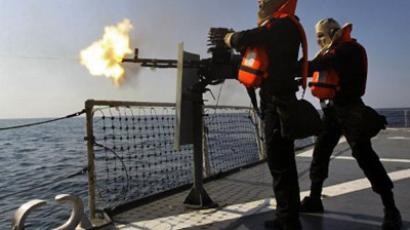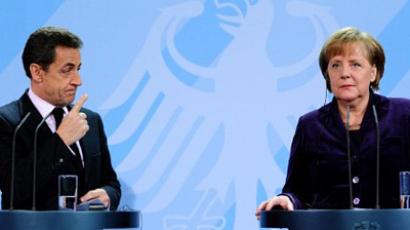France robbed of choice and sovereignty
RT talks to the French writer an activist Alain Soral who is considered a controversial figure in his home country because he holds views which more often than not challenge the status quo and raises topics considered taboo.
RT: What is it that you dislike so much about the status quo in France that you feel compelled to go against?Alain Soral: First of all, today, we can no longer believe in the masquerade of a political left and right. For a long time here in France, unlike Anglo-Saxon countries – even Germany and the United States – there was a real alternative in French politics, meaning there was the Communist Party and there was the whole movement of economic liberalism. There was real political diversity in France. But gradually, the so-called “left” eventually gravitated towards economic liberalism – the right. The only differences between the left and the right were small variations in their positions on ethics and society. The best example is, right now, we have Francois Hollande and Nicolas Sarkozy. There’s no real opposition between left and right. It doesn’t exist. They are all roughly economic liberals, libertarians.For France, the first step of visible liberalism is the European Union. There are those who submit to the EU, which means the end of borders, free movement of goods and capital, ideology of right and left, the ideology of miscegenation. This is the dominant ideology in France shared by left and right. The difference is only aesthetic. And then there are those who oppose this dominant ideology, who fight for the restoration of borders, the restoration of the nation; those who criticize the ideology of miscegenation, meaning to defend cultural identities and so on. The battle today is to resist globalism on economic and cultural fronts, etc. We have to show that the fight between left and right no longer exists. Today the two battling sides are the globalists and those resisting globalism.RT: Your motivation is just to be the voice of opposition?A.S.: Yes, it embodies the new opposition, and it has one important distinction – this opposition has no place in today’s institutional system, whereas before, and for historical reasons, there was opposition within the establishment. But today, even in television, there’s a centrifuge which excludes and marginalizes people who are not liberals, globalists, human rights hardliners, pro-American, pro-Zionist. It can be seen clearly. There’s no opposition in the establishment anymore these days. I may have been the last one even to be invited to talk on shows on prime time French television. And that went wrong. The people who invited me ended up having problems.RT: You are for a multi-polar world. Is that just for the sake of seeing more balance or do you disagree fundamentally with the major powers and agree with the policies, personalities and systems of government of those who try to counter them?A.S.: I’m still a French patriot who tries to fight to defend French sovereignty and French identity – as I see it. So every time, every position I take is always from the French point of view. It’s just like when I was a Communist in the ‘90s, when I was in the French Communist Party. It was because I realized that for things to be in the interest of France, there had to be two superpowers. For in fact, France existed, as general De Gaulle had understood, because of the US-USSR balance. So I was pro-Soviet, not because I thought that the USSR was very good, but because I thought that the USSR was very good for France and French interests.If I’m fighting the new world order, it’s only because I think France has everything to lose with respect to this new world order. France has an interest in a multi-polar world. I think France has an interest in a strong and growing Russia right now. However, I’m also pro-Serb, because I think that Serbians are the great people of the Balkans and because there is a traditional link between France and Serbia. Today, the dominant ideology is so delusional that it’s almost strange to say, “I am French who cares first and foremost for the interests of the French.” In France, this is almost regarded as fascist because “national preference” is forbidden in France, which is unheard of.RT: The French elections are coming up soon. What results are you expecting, especially in the final round? Who will be the two candidates running for it at the end?A.S.: With the French elections, we can clearly see today that the French system that was developed by de Gaulle and the Fifth Republic is being destroyed to make way for an American system. So you have the incumbent, Nicolas Sarkozy, on the right. And then you had the primary election in the left-wing political parties. It’s like the Republicans and Democrats in the US – there is actually no difference between the two sides. Left and right are both liberals, economically speaking. Maybe one want to legalize weapons and the other doesn’t. But the reality is, there is no alternative management. We arrive at the same thing.In France today, there’s Sarkozy, and after the primary election in the Socialist Party – which was a circus – the winner was Francois Hollande. Now, the media then reduces the Sarkozy-Hollande political debate into a war of catchphrases, for example with Hollande calling Sarkozy the “bad guy”. It’s pure theater! There is no political content because in reality, they are both fans of the European Union. They cannot do what they pretend to want to do, like re-industrialization, saving companies. What they’re proposing are against EU laws.The Socialist Party and the ruling Union for a Popular Movement have ratified 93 per cent of what the EU proposed. Sarkozy and Hollande are two economic liberal candidates with very minimal differences in stands on social issues. Which is why I’m interested in Marine Le Pen, who has good poll ratings, and offers an alternative: leave the European Union, go back to the French France and defy Wall Street.The other two try to pretend she doesn’t exist. They try to get the French into the American system. They are afraid Marine Le Pen can make it to the second round of the presidential elections. If that happens, it would expose the lie of the French system. With a huge amount of media effort, through television shows, they try to bring the French people into a situation of actually having no choice. Voilà, you have Hollande and Sarkozy. In France we say it’s like “choosing between Tweedledee and Tweedledum”. It’s sometimes a very subtle form of totalitarianism using liberalism, which is smarter than a dictatorship. You give two choices that are essentially the same.RT: You are against the EU, against the euro. What economic system do you see for France?A.S.: When you look at the reality of the past 20 years, the European Union has changed very little. By the way, if we remember, back then, we were still having referendums on such decisions. So the Maastricht referendum got through, but in the second referendum, on the Lisbon Treaty, the French voted no. In Ireland, they voted no. It was rejected by the people, but then forcibly voted in by MPs. This means that the National Assembly betrayed the people of France. It does not represent the people in statistical terms. Lisbon has been ratified by the National Assembly overwhelmingly when the people rejected the Treaty in a referendum. It is clear that this representative democracy actually represents no one at all.Today, the European Union is scared of the people and of consulting the people. There’s also the demonization of the people, treating them as though they’re stupid, as though they won’t understand. This is a real right-wing ideology. “Men are idiots, sheep that must be led by an elite against their will.” It’s an ideology that can be called extreme right.The European Union was meant to bring down unemployment, bring prosperity, security, whatever you want to call it. But instead it brought unemployment. The adoption of the euro-inflated prices, it caused de-industrialization, especially in France. It may be better for Germany, but it’s an economic disaster. On the security front, it’s been a disaster with Schengen, a total loss of border control. The French have long been familiar with that widespread disaster. It doesn’t work and now it’s worse than before.Even today, economic experts say it’s about to collapse. It’s not even a question of whether it’s good or bad, it’s falling apart mechanically. The euro is exploding. The single currency is a technical impossibility. A Europe of 27 countries cannot work. We see that this huge “thing” is crumbling and has only brought negative effects, practically. With Merkel and Sarkozy meeting every three days, it’s getting ridiculous. Now there’s a summit every three days. It’s no good. It’s close to collapse.RT: You’ve discussed media coverage of the Arab Spring, Occupy Wall Street, etc. What’s your take on how such events are portrayed in France?A.S.: Already there is a very big difference in the treatment of Occupy Wall Street and the Arab revolutions. We don’t talk in mainstream media about the riots and demonstrations challenging the power of the US banking oligarchy. We do not want to see internal unrest that exists right now in the United States, which is very serious. They are absolutely not reported in the French media. Nothing! Zero! Whereas, all day long, we hear about the Arab Spring. We were given non-stop coverage of Libya and we hear about Syria all day long.The street demonstrations and political rallies in the US are important. I haven’t seen Bashar al-Assad ask Obama to step down. Or the Queen of England! There is also a lot of social unrest in England. So in reality, the problem is that in this world, what we call “the Empire” dominates the Western media.People swallow all this and think that all is well in the US. It is the largest democracy in the world. But now against Syria, it’s fire and blood. Gaddafi was eating small children! The French media, and I don’t just mean mainstream media, but also newspapers that were traditionally read by French intellectuals. There is a total collapse of political analysis in France. The only serious analysis available is on the Internet. But it’s a very small niche. That’s the French situation. The French know nothing of the serious problems in the United States but they are exposed to the Syrian situation throughout the day. RT: Do you not see any merit for France from interdependence with other countries? We’re living in an increasingly globalized world. Wouldn’t it be detrimental to France to be isolated, looking inwards rather than outwards?A.S.: Well, with that, we have the impression that the alternative is that there are only two choices: the new world order which means open borders, globalism, total submission to the US, or closing in on ourselves. In fact, the alternative is neither of those. First, we have the option of using functional borders – not as barriers, but as doors and windows that can be opened more or less for reasons of protectionism, which is acknowledged by all serious economists. From a partnership point of view, it is well known that our logical partner with whom we have an interest is Russia rather than the US.














